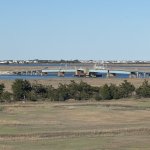COURT HOUSE – In a new effort to jumpstart economic development in Middle Township, the township’s Economic Development Council, working with the consulting group TRIAD Associates, has called on Township Committee to seriously consider designating specific areas of the township as redevelopment or rehabilitation zones.
The move would open the door to the use of a number of incentives to encourage business to move into the township or to stay and reinvest.
At a public presentation to Township Committee Sept. 20, TRIAD consultants Michael Zumpino and Stephen Kehs displayed maps of the township that identified five potential areas that could meet the statutory definition for rehabilitation zones.
Five Preliminary Areas
The areas include:
– A large part of the main retail area in Court House, moving down Route 9 as far as Locust Lane.
– A smaller commercial area located off Stone Harbor Boulevard across from Blackberry Drive.
– The Rio Grande retail corridor along the Route 9 and Route 47 intersection.
– The Lamonica site off Indian Trail Road.
– The Cape Harbor site on Rio Grande Avenue just before Middle Township transitions to Wildwood.
Business Administrator Elizabeth Terenik said using the flexibilities offered by rehabilitation and redevelopment designations “gives us more tools in the toolbox” to attract and help revitalize businesses.
Brian Murphy, chair of the Economic Development Council, called the work done to date preliminary, but he urged the governing body to move on the concept.
Local Housing and Redevelopment Law
State statutes allow municipalities to utilize otherwise unavailable incentives in order to facilitate the planned development or rehabilitation of designated areas that meet statutory definitions.
The easiest example is a tax abatement program that can forgo part of the normal taxes due on redeveloped or rehabilitated areas which are part of a planned project in a designated zone.
The new assessment giving value to any investments does not change but that portion of the assessed value that is directly linked to the new investment is eligible for tax abatement.
For a rehabilitation project, for example, a new investment under the program that increases the normal appraised value of a property by $100,000 could see a five-year abatement schedule that requires only 20 percent of the normal taxes on the additional value, increasing to 40 percent the next year and so forth until the schedule hits 100 percent.
This incentive to investment is one of the things that the township can offer in its efforts to attract or retain businesses and encourage investment. It can only be offered within the context of a program covered by the statute.
Rehabilitation and redevelopment are not synonymous.
To designate a rehabilitation zone, the township uses its Planning Board to develop viable project areas guided by statutory requirements. The proposal, supported by evidence, must then be approved by the governing body. It is then sent for review by the state.
TRIAD and the Economic Development Council did a preliminary investigation of the township’s commercial areas, coming away with the five areas singled out in the presentation. The Planning Board has yet to consider the recommendations.
A rehabilitation area requires meeting statutory definitions which are easier to meet than those for a redevelopment area. The flexibilities gained with a successful designation are also more limited under rehabilitation than they are under redevelopment.
One example is that an abatement schedule under a rehabilitation plan cannot exceed five years, under redevelopment it can run 30 years.
Seeking either designation will require not only proving that the area(s) meet the law’s definitions, but also developing a specific development plan for use with a redeveloper of the area in question.
A benefit of the process is that it forces municipalities further into planned development and less into opportunistic development.
Next Steps
The process to seek rehabilitation or redevelopment designations for township commercial areas will start with a commitment from the governing body and that body will set goals for development.
The Planning Board would then be asked to do the necessary.
Planning Board Chair Anthony Anzelone said that the board would welcome the process. “We have been talking about this a long time,” he said.
Terenik’s successful experience with this process is a plus for the committee which is likely to begin the process soon.
Committee Member Timothy Donohue, who supported the effort, offered a caution. “We have to handle the perception of this process well,” he said. “Words matter, they mean things. We don’t want any stigma of blight on the township.”
Existing Revolving Loan Program
One of the tools currently used by the township to encourage business investment is a revolving loan program. It was this program that helped jumpstart the location of the 7 Mile Brewery in Rio Grande.
The program makes appropriate loans over a maximum of five years. The loan limit is $100,000. As the loans are repaid, the capital in the loan fund is replenished.
TRIAD consultants presented township committee with two possible avenues for expanding the loan program with funds from the N.J. Economic Development Authority and the U.S. Department of Agriculture.
The two options were preliminarily presented with no discussion on qualification requirements or how they might fit with the township’s existing programs.
Zumpino said these would both need further consideration before determining if there are viable options in the township.
To contact Vince Conti, email vconti@cmcherald.com.
Lower Township – Son: Dad, when I grow up I want to be like President Trump. Dad? Why? Son: Well, when things go great I'll take credit. When things go bad I'll blame someone else! Dad: Son, we have to talk…








